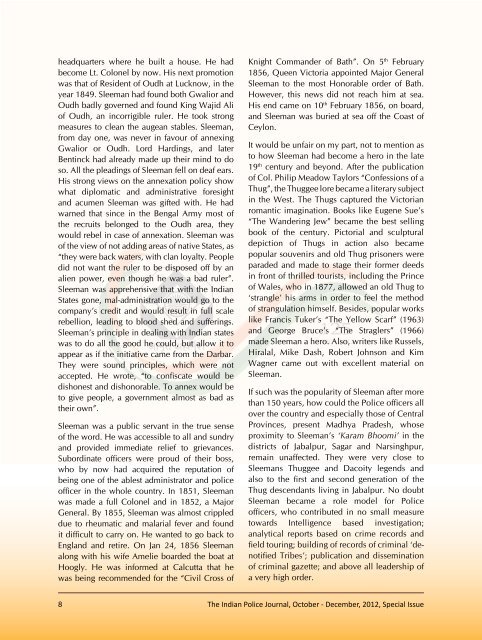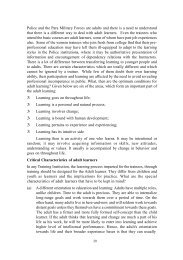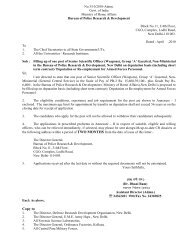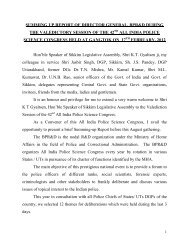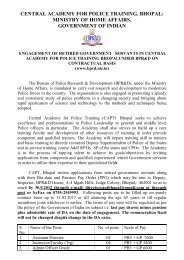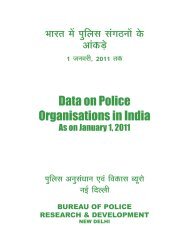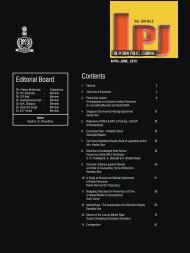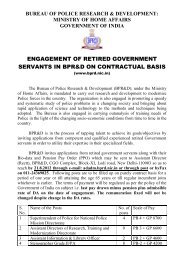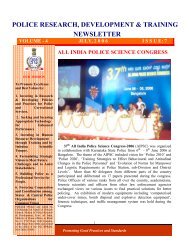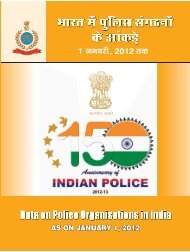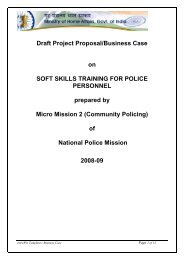Editorial Board Contents - Bureau of Police Research and ...
Editorial Board Contents - Bureau of Police Research and ...
Editorial Board Contents - Bureau of Police Research and ...
Create successful ePaper yourself
Turn your PDF publications into a flip-book with our unique Google optimized e-Paper software.
headquarters where he built a house. He hadbecome Lt. Colonel by now. His next promotionwas that <strong>of</strong> Resident <strong>of</strong> Oudh at Lucknow, in theyear 1849. Sleeman had found both Gwalior <strong>and</strong>Oudh badly governed <strong>and</strong> found King Wajid Ali<strong>of</strong> Oudh, an incorrigible ruler. He took strongmeasures to clean the augean stables. Sleeman,from day one, was never in favour <strong>of</strong> annexingGwalior or Oudh. Lord Hardings, <strong>and</strong> laterBentinck had already made up their mind to doso. All the pleadings <strong>of</strong> Sleeman fell on deaf ears.His strong views on the annexation policy showwhat diplomatic <strong>and</strong> administrative foresight<strong>and</strong> acumen Sleeman was gifted with. He hadwarned that since in the Bengal Army most <strong>of</strong>the recruits belonged to the Oudh area, theywould rebel in case <strong>of</strong> annexation. Sleeman was<strong>of</strong> the view <strong>of</strong> not adding areas <strong>of</strong> native States, as“they were back waters, with clan loyalty. Peopledid not want the ruler to be disposed <strong>of</strong>f by analien power, even though he was a bad ruler”.Sleeman was apprehensive that with the IndianStates gone, mal-administration would go to thecompany’s credit <strong>and</strong> would result in full scalerebellion, leading to blood shed <strong>and</strong> sufferings.Sleeman’s principle in dealing with Indian stateswas to do all the good he could, but allow it toappear as if the initiative came from the Darbar.They were sound principles, which were notaccepted. He wrote, “to confiscate would bedishonest <strong>and</strong> dishonorable. To annex would beto give people, a government almost as bad astheir own”.Sleeman was a public servant in the true sense<strong>of</strong> the word. He was accessible to all <strong>and</strong> sundry<strong>and</strong> provided immediate relief to grievances.Subordinate <strong>of</strong>ficers were proud <strong>of</strong> their boss,who by now had acquired the reputation <strong>of</strong>being one <strong>of</strong> the ablest administrator <strong>and</strong> police<strong>of</strong>ficer in the whole country. In 1851, Sleemanwas made a full Colonel <strong>and</strong> in 1852, a MajorGeneral. By 1855, Sleeman was almost crippleddue to rheumatic <strong>and</strong> malarial fever <strong>and</strong> foundit difficult to carry on. He wanted to go back toEngl<strong>and</strong> <strong>and</strong> retire. On Jan 24, 1856 Sleemanalong with his wife Amelie boarded the boat atHoogly. He was informed at Calcutta that hewas being recommended for the “Civil Cross <strong>of</strong>Knight Comm<strong>and</strong>er <strong>of</strong> Bath”. On 5 th February1856, Queen Victoria appointed Major GeneralSleeman to the most Honorable order <strong>of</strong> Bath.However, this news did not reach him at sea.His end came on 10 th February 1856, on board,<strong>and</strong> Sleeman was buried at sea <strong>of</strong>f the Coast <strong>of</strong>Ceylon.It would be unfair on my part, not to mention asto how Sleeman had become a hero in the late19 th century <strong>and</strong> beyond. After the publication<strong>of</strong> Col. Philip Meadow Taylors “Confessions <strong>of</strong> aThug”, the Thuggee lore became a literary subjectin the West. The Thugs captured the Victorianromantic imagination. Books like Eugene Sue’s“The W<strong>and</strong>ering Jew” became the best sellingbook <strong>of</strong> the century. Pictorial <strong>and</strong> sculpturaldepiction <strong>of</strong> Thugs in action also becamepopular souvenirs <strong>and</strong> old Thug prisoners wereparaded <strong>and</strong> made to stage their former deedsin front <strong>of</strong> thrilled tourists, including the Prince<strong>of</strong> Wales, who in 1877, allowed an old Thug to‘strangle’ his arms in order to feel the method<strong>of</strong> strangulation himself. Besides, popular workslike Francis Tuker’s “The Yellow Scarf” (1963)<strong>and</strong> George Bruce’s “The Straglers” (1966)made Sleeman a hero. Also, writers like Russels,Hiralal, Mike Dash, Robert Johnson <strong>and</strong> KimWagner came out with excellent material onSleeman.If such was the popularity <strong>of</strong> Sleeman after morethan 150 years, how could the <strong>Police</strong> <strong>of</strong>ficers allover the country <strong>and</strong> especially those <strong>of</strong> CentralProvinces, present Madhya Pradesh, whoseproximity to Sleeman’s ‘Karam Bhoomi’ in thedistricts <strong>of</strong> Jabalpur, Sagar <strong>and</strong> Narsinghpur,remain unaffected. They were very close toSleemans Thuggee <strong>and</strong> Dacoity legends <strong>and</strong>also to the first <strong>and</strong> second generation <strong>of</strong> theThug descendants living in Jabalpur. No doubtSleeman became a role model for <strong>Police</strong><strong>of</strong>ficers, who contributed in no small measuretowards Intelligence based investigation;analytical reports based on crime records <strong>and</strong>field touring; building <strong>of</strong> records <strong>of</strong> criminal ‘denotifiedTribes’; publication <strong>and</strong> dissemination<strong>of</strong> criminal gazette; <strong>and</strong> above all leadership <strong>of</strong>a very high order.8The Indian <strong>Police</strong> Journal, October - December, 2012, Special Issue


